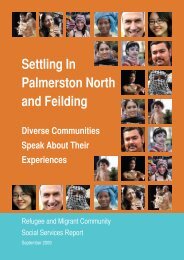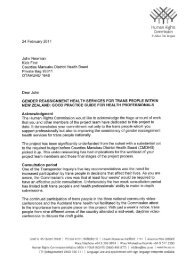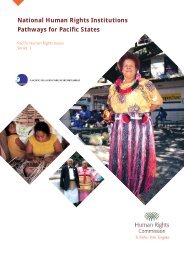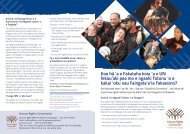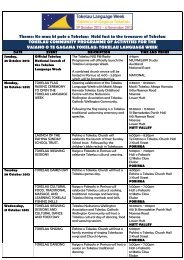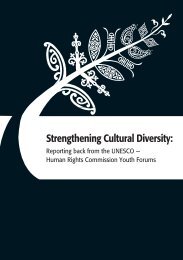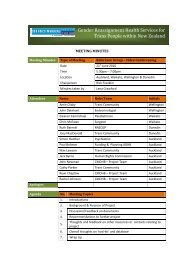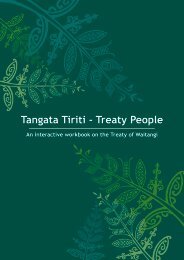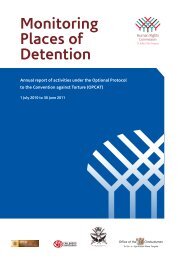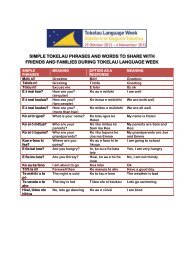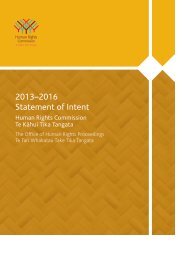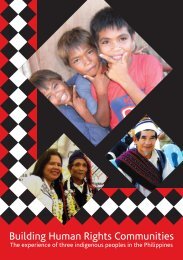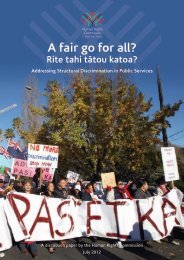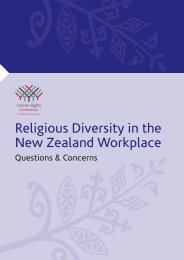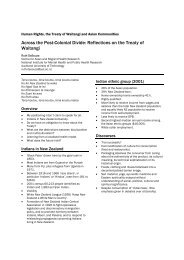16. Rights of Children and Young People - Human Rights Commission
16. Rights of Children and Young People - Human Rights Commission
16. Rights of Children and Young People - Human Rights Commission
Create successful ePaper yourself
Turn your PDF publications into a flip-book with our unique Google optimized e-Paper software.
246<br />
SECTION FOUR – RIGHTS OF SPECIFIC GROUPS<br />
Definition <strong>of</strong> the child<br />
Article 1 <strong>of</strong> UNCROC provides that “child means every<br />
human being below the age <strong>of</strong> 18 years unless under the<br />
law applicable to the child, majority is attained earlier”.<br />
Since 2004, the Care <strong>of</strong> <strong>Children</strong> Act <strong>and</strong> several other<br />
pieces <strong>of</strong> subsequent legislation have been enacted which<br />
reflect this definition. However, several areas remain<br />
where age limits in legislation are inconsistent with<br />
UNCROC.<br />
The CRC has previously expressed concern <strong>and</strong> recommended<br />
that these inconsistencies be addressed. 31 An<br />
area specifically highlighted by the CRC was the gap in<br />
protection for 17-year-olds under the <strong>Children</strong>, <strong>Young</strong><br />
Persons <strong>and</strong> their Families Act. The committee urged<br />
New Zeal<strong>and</strong> to extend the act’s protections to all those<br />
under 18 years <strong>of</strong> age. Proposed legislation to achieve<br />
this (the CYPF Amendment (No. 6) Bill) was introduced to<br />
Parliament in 2007, public submissions were made <strong>and</strong> a<br />
select committee report was issued in 2008. Since then,<br />
following the change <strong>of</strong> government, the bill has not been<br />
progressed.<br />
A lack <strong>of</strong> consistency in agencies’ definitions <strong>of</strong> the child,<br />
<strong>and</strong> the resulting variable availability <strong>of</strong> protections<br />
to children <strong>and</strong> young people, was highlighted by the<br />
Ombudsmen in their 2007 investigation into prisoner<br />
transport. 32 The investigation stemmed from the tragic<br />
death <strong>of</strong> 17-year-old Liam Ashley in 2006 while being<br />
transported in a prison van with adult prisoners. The<br />
Ombudsmen’s recommendations included the need<br />
for alignment <strong>of</strong> police <strong>and</strong> department <strong>of</strong> corrections’<br />
definitions <strong>of</strong> young prisoners, in order to ensure that<br />
protections were consistently provided. A revised<br />
memor<strong>and</strong>um <strong>of</strong> underst<strong>and</strong>ing between the two<br />
agencies, signed in December 2009, now clarifies the<br />
agreed-on st<strong>and</strong>ards to be used. 33<br />
Employment protections<br />
As discussed earlier, the New Zeal<strong>and</strong> Government maintains<br />
its exemption to UNCROC <strong>and</strong> non-acceptance <strong>of</strong><br />
ILO 138 relating to employment <strong>of</strong> children. This is on the<br />
basis that New Zeal<strong>and</strong> law <strong>and</strong> policy provides adequate<br />
age thresholds for entry into work <strong>and</strong> protection for<br />
children <strong>and</strong> young people in employment. For example,<br />
the Education Act 1989 prohibits employers from<br />
employing children under 16 during school hours or<br />
when it would interfere with their attendance at school.<br />
The Health <strong>and</strong> Safety in Employment Act 1992 <strong>and</strong><br />
Regulations 1995 set out health <strong>and</strong> safety obligations<br />
<strong>and</strong> contain restrictions on young people under 15<br />
working in certain dangerous workplaces, working at<br />
night or undertaking hazardous work (such as working<br />
with machines <strong>and</strong> heavy lifting).<br />
New Zeal<strong>and</strong> has a strong tradition <strong>of</strong> children <strong>and</strong> young<br />
people being able to undertake ‘light work’ for pocket<br />
money, <strong>and</strong> there is a view that prescribing a minimum<br />
working age would undermine this tradition.<br />
However, there are indications that stronger employment<br />
protections are required. Increasingly, the available<br />
evidence suggests that children are being exposed to<br />
more labour intensive work, for example on farms, <strong>and</strong><br />
for longer working hours than previously. The <strong>Human</strong><br />
<strong>Rights</strong> <strong>Commission</strong>’s National Conversation about Work<br />
(2008–10) found a number <strong>of</strong> situations where young<br />
people were working excessive, very early or very late<br />
hours, with negative impacts on their schooling. There<br />
were also indications <strong>of</strong> a prevalence <strong>of</strong> stereotypes <strong>and</strong><br />
discriminatory attitudes about employing young people.<br />
Furthermore, youth unemployment was a serious concern<br />
in most regions visited. These issues are also discussed in<br />
the chapter on the right to work.<br />
Section 30(2) <strong>of</strong> the <strong>Human</strong> <strong>Rights</strong> Act 1993 provides for<br />
an age exemption to the act’s employment discrimination<br />
provisions. This allows someone under the age <strong>of</strong> 20 to be<br />
paid at a lower rate than another person employed in the<br />
same or substantially similar circumstances.<br />
<strong>Children</strong> under 16 years <strong>of</strong> age are excluded from the<br />
<strong>Human</strong> <strong>Rights</strong> Act’s age discrimination provisions. 34 This<br />
has attracted criticism from human rights advocates,<br />
31 United Nations Committee on the <strong>Rights</strong> <strong>of</strong> the Child (2003), paras 20–21<br />
32 Office <strong>of</strong> the Ombudsmen (June 2007), Ombudsmen’s Investigation <strong>of</strong> the Department <strong>of</strong> Corrections in relation to the Transport <strong>of</strong><br />
Prisoners, Wellington: Office <strong>of</strong> the Ombudsmen<br />
33 Signed in December 2009: http://www.corrections.govt.nz/news-<strong>and</strong>-publications/magazines-<strong>and</strong>-newsletters/corrections-news/2011/<br />
corrections-news-jan-feb-2010/new-underst<strong>and</strong>ing-with-police.html<br />
34 <strong>Human</strong> <strong>Rights</strong> Act 1993, s21(1)(i)



